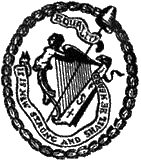Insurrection
Acts
First introduced during 1796, the act imposed the death penalty
(replaced in 1807 by transportation for life) on persons administering illegal
oaths. It also allowed government to proclaim specific districts as disturbed,
thereby imposing a curfew, suspending trial by jury, and giving magistrates
sweeping powers of search and detention. The act was in force during 1796-1802,
and was reintroduced, with modifications, in 1807-10, 1814-18, and
1822-5.1
View 1796 Act
View 1822 Act
From 1833 a new type of Coercion Act took over as the standard
response to Irish disorders.2
Early acts releasing the stringency of the penal laws were
passed in 1771 and 1774.
Coercion Acts was a general term for a series of measures that
commenced with the Suppression of Disturbances Act (1833). Like the earlier
Insurrection Act, this empowered the lord lieutenant to proclaim a district as
disturbed, permitting the imposition of a curfew and other restrictions, as
well as detention without trial for up to three months. It differed from the
Insurrection Act in providing for trial by military courts rather than
magistrates in special session.3
Footnotes
- S J Connolly ed The Oxford Companion to Irish History
OUP 1998 p260
- Ibid p260
- Ibid p101
|
